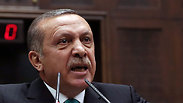
Turkey's Erdogan. Using social networks for his own purposes
צילום: AP
Technology in the service of tyrants
Op-ed: People once argued that countries with Internet and social networks would forever be fortified democracies. The past years' events have refuted this argument.
We thought it couldn't happen these days. Under no circumstances. When the protests broke out in Syria, an American commentator wrote that there was an enormous difference between what Assad could take the liberty to do today and what his father was able to do: Assad Sr. slaughtered tens of thousands of his rivals unrestrainedly because it was possible at the time to conceal these horrors from the citizens. Today, in the Internet era, in the Facebook and Twitter era, it's impossible. The tyrants' hands are tied: Tied by technology.
It turns out that technology didn't tie their hands after all. Technology didn't tie Putin's hands either. On the contrary, it strengthened him. He didn't have to impose serious restrictions on Internet surfing; he used it to praise and glorify Crimea's annexation, spread hatred against the current Ukraine government, and at the same time to denigrate America and make fun of its weaknesses. The Internet has been revealed as a powerful tool like no other for spreading nationalism, aggressiveness and lies.
Facebook and Twitter may have helped bring down dictatorships in Libya, Egypt and Tunisia, but they also helped bring down the democracies established for a short period of time on the ruins of the tyrannies.
Turkish Prime Minister Erdogan used the Internet to recruit masses to protest for him and against the defenders of democracy in Istanbul. He inspired the establishment of allegedly nonpartisan – and in fact governmental – websites, and used them to attack his rivals. Once the bluff was exposed, Erdogan is now trying to lock Twitter's gates – until he comes up with another device to use social networks for his own purposes, like the regime's guards are doing in China and Iran, for example.
Connecting extremists
The term "state-controlled press," which was common in the Soviet bloc, has now been revived in a technological format which makes it difficult to identify the owners and operators. The disguised governmental media have learned the populist discourse and are inciting their readers and Web surfers against "interested people," "connected people," professional army officers, judges, labor unions, "tycoons," foreigners – against everyone, as long as the anger does not approach the prime minister and his entourage.Here is the Turkish absurdity (only Turkish?): The prime minister, who has a press with large circulation, funded by billionaires who are his yes men, is trembling with fear at the thought of some media outlets that still remain free. If he only could, Erdogan (only Erdogan?) would "dismantle" all the independent press in his country. In the meantime he is fighting it through impersonation, disguise, and finally also direct electronic censorship.
Remember how we were promised that in the Skype and cellular phone era there will be no wiretapping and secret recordings? Remember how people said that there was no technological method to secretly record the ocean of information passing through them? It turns out that there definitely is, and not just one method. The Americans record, the Russians, the Chinese, the Israelis… Who doesn't? The governmental wiretapping industry has never been so developed, so detailed and so invasive as it is today. Thanks to technology, what else?
Technology allows radical, marginal and dangerous groups to integrate and add inactive supporters. Without technology they would not have been aware of the pool of people sharing their opinion. Fanaticism and prejudice blossom in the closed discourse groups. With one touch of a screen, a group member can cut himself off from anything undermining the comprehensive worldview accepted by his friends.
In the past, some argued that countries with McDonald's restaurants would not fight against each other. Then some argued that countries with Internet and social networks would forever be fortified democracies. The past years' events have refuted these arguments.
The exposure to information technology does not guarantee civil rights, tolerance and openness. It does not cancel the dark nationalism, racism and anti-Semitism, or the support of a firm hand, violent tendencies and the addiction to separatism. Technological progress is not to blame for humanity's diseases, but the hope that it will cure them has faded away.










